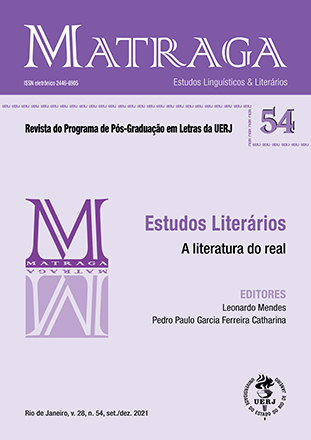Que corpo é esse? A cidade e o real no conto “A unha encravada e o esmalte” (2016), de Allan da Rosa
DOI:
https://doi.org/10.12957/matraga.2021.59528Palavras-chave:
Representação, Realismo, Ficção contemporânea, Allan da Rosa.Resumo
Tendo como ponto de partida a discussão das formas de realização do realismo na ficção brasileira contemporânea, a reflexão aqui apresentada propõe uma análise do conto “A unha encravada e o esmalte”, de Allan da Rosa, de modo a observar como a fragmentação do corpo atua na representação da cidade e de suas desigualdades, tendo como cenário as passeatas que se realizaram em todo o Brasil, em junho de 2013. A leitura parte da hipótese de que o conto assume, nos termos propostos por Tania Pellegrini (2018), uma postura realista sustentada em um posicionamento crítico que promove uma “representação em profundidade” da constituição social, fazendo uso de recursos estéticos pautados não na narração de fatos ou na descrição de espaços, mas na captura do modo como cada corpo se relaciona com o espaço e com outros corpos. Sob esse aspecto, a análise aqui realizada coloca em evidência a deformação do corpo como instrumento central na composição da narrativa, projetando-se na representação da cidade e das estruturas sociais que a compõem como corpo fragmentado e desigual.
Downloads
Downloads
Publicado
Como Citar
Edição
Seção
Licença
AUTORIZAÇÃO
A Matraga – Revista do Programa de Pós-Graduação em Letras da UERJ está autorizada a publicar o artigo ora submetido, caso seja aceito para publicação online. Fica atestado que a contribuição é original, que não está sendo submetida a outro editor para publicação, e que a presente declaração é a expressão da verdade.
Os trabalhos publicados no espaço virtual da Matraga – Revista do Programa de Pós-Graduação em Letras da UERJ serão automaticamente cedidos, ficando os seus direitos autorais reservados à Matraga. Sua reprodução, total ou parcial, é condicionada à citação dos autores e dos dados da publicação.

A Matraga utiliza uma Licença Creative Commons - Atribuição-NãoComercial 4.0 Internacional.





